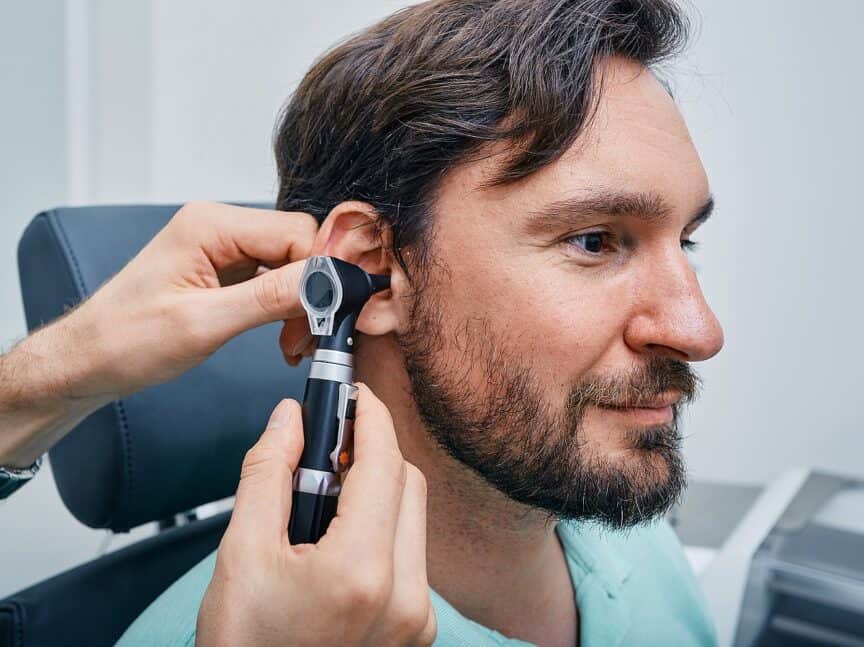- How to Care for Infants With Hearing Loss - April 15, 2024
- Hearing Aid Tips for Runners - April 5, 2024
- Overcoming Misconceptions Around Hearing Aids - March 27, 2024
In honor of American Diabetes Month, this November we are looking at the role diabetes can play in hearing loss as well as tips for preventing hearing loss in those with diabetes. With over 37 million Americans living with diabetes and hearing loss being twice as common in those with diabetes compared to those without, education about both diabetes and hearing loss is now more relevant and important than ever.
Diabetes and Hearing Loss
There are three types of diabetes: type 1 diabetes, type 2 diabetes, and gestational diabetes. Type 2 diabetes is by far the most common, with approximately 90-95% of diabetes being type 2.
The pancreas is responsible for producing insulin in the body in response to the body’s blood sugar levels. Hyperglycemia, or high blood sugar, should signal the pancreas to produce insulin at a rate that would reduce sugar levels into a normal, safe range. In type 2 diabetes, sustained high blood sugars cause the pancreas to overproduce insulin and eventually fail to keep up. When this happens, insulin needs to be injected in place of the insulin that the body is unable to produce.
So how does this impact hearing? The exact cause is unknown however long term impacts of high blood sugar is known to cause small blood vessel and nerve damage. It is these changes that cause complications from kidney and heart disease to vision issues and likely cause changes to hearing as well.
Prevention and Treatment
The good news is that both diabetes and hearing loss have treatment options. They both also have reasonable care and management to prevent further issues down the line. While these are interconnected in many ways, we will look at the prevention and treatment options separately below.
Diabetes
The close management of diabetes can prevent further complications from the disease.
- Eat healthy- With diabetes, carbohydrate counting, meal planning, and grocery shopping can seem like difficult tasks. Speak with your healthcare provider or a dietician to come up with a plan. They will likely be able to provide tips that will make the process much simpler.
- Exercise- Exercise is good for both physical and mental health. For those with diabetes specifically, exercise can make the body more sensitive to insulin. In turn, this can help reduce the amount of extra insulin that will need to be injected to maintain normal blood sugars.
- Monitor sugars- This may seem like a no brainer, but more than just food and drink can alter your body’s blood sugar levels. For example, when we are sick or normal routines and sugars may be out of balance as well. It will be even more important to check levels regularly then.
Hearing Loss
While damage to your hearing may occur with diabetes, there are other steps you can take to minimize the risk of damaging your hearing further.
- Noise protection- Another cause of hearing loss can come from noise exposure. Whether consistent exposure to moderately loud noises or one sudden loud sound, they can all cause further damage to your hearing. Wear hearing protection such as ear plugs or headphones if you plan to be in a noisy environment such as a sport stadium or concert venue.
- Annual hearing tests- With diabetes, if is a good idea to get an annual hearing test, or audiogram. Even without any noticeable signs or symptoms of hearing loss, you may have begun to experience some hearing loss already. The annual hearing test will allow you to monitor that closely and treat it as necessary.
Treatment for hearing loss from diabetes is the same as treatment for hearing loss without diabetes. Most commonly that will be hearing aids. Hearing aids are used to treat mild, moderate, and sometimes severe hearing loss. They are programmed to treat your unique hearing loss needs by amplifying the exact frequencies you need and can be adjusted if your hearing changes.
If you develop profound hearing loss, cochlear implants may be a better option for you. They work differently than hearing aids by stimulating the auditory nerve to create something that you can recognize.
If you have diabetes, set up an appointment with an audiologist today to get a baseline hearing test and talk about any signs or symptoms of hearing loss you may be experiencing.

